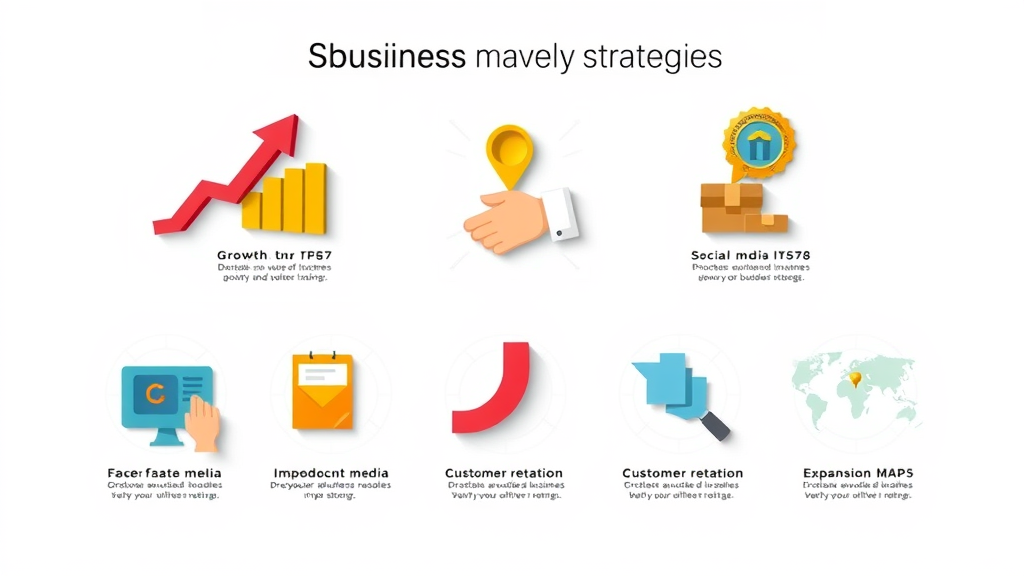Did you know that nearly 90% of startups fail within their first few years ? Yet, those who leverage smart business growth strategies for entrepreneurs often thrive, even in highly competitive markets. This in-depth guide will not only reveal little-known facts about what truly fuels sustainable success but will also give you access to actionable, expert-backed tactics so you can drive your business grow and stand out as a savvy business owner. Whether you're looking to expand your market share or refine your growth strategy, you'll find step-by-step insights here critical for small businesses and ambitious entrepreneurs alike.

Unlocking Business Growth Strategies for Entrepreneurs: Surprising Statistics and Fundamental Insights
- Discover why 90% of startups fail, yet those who apply advanced business growth strategies for entrepreneurs outperform the competition. This article uncovers little-known data and practical tactics to drive business grow, revealing expert-backed growth strategies that work.
The harsh reality is that the vast majority of startups don’t make it past the critical early stages. Yet, studies from leading business growth strategists have found that the right combination of innovative marketing strategies, operational focus, and customer-centric thinking can dramatically skew the odds in your favor. Recent data shows entrepreneurs who employ strategic growth strategies are 70% more likely to surpass the five-year mark, quickly gaining traction and market share despite industry disruptors and new competitors.
What sets these success stories apart is the conscious decision to treat business growth not as an accident, but as a structured, deliberate effort. These entrepreneurs use detailed growth strategy plans—addressing everything from market penetration tactics to scalable product line enhancements. This guide helps you do the same, equipping you with fundamentals, practical steps, and advanced approaches to outpace rivals and secure long-term, sustainable growth.
Why Business Growth Strategies for Entrepreneurs Matter in Today’s Competitive Landscape
In today’s fast-paced entrepreneurial environment, simply having an outstanding product or service is not enough. Business growth strategies for entrepreneurs matter more than ever due to rapidly evolving technology, shifting customer behaviors, and increasing competition from small business upstarts and established brands. Strategic planning and timely execution can mean the difference between fading into obscurity and crafting a thriving, resilient business.
Entrepreneurs who invest time in developing robust business growth strategies can expect to improve their customer base, enhance overall customer experience, and reposition their brand for market expansion. Focusing on effective growth strategies like strategic partnerships, customer-centric service improvements, and continual product development lays the foundation for a business model capable of withstanding economic shifts and disruption.
How a Growth Strategy Determines Long-Term Business Success
- Understand how a robust business growth strategy enables business owners to achieve sustainable growth, improve customer experience, and increase market penetration.
A well-designed growth strategy acts as a business’s guiding light, outlining clear objectives, measuring progress, and keeping everyone focused on sustainable growth. By defining core goals and key performance indicators, entrepreneurs can ensure team alignment and adapt swiftly to new opportunities. Market penetration, for instance, isn’t just about increasing sales, but about building deep trust and loyalty with your target audience while expanding your market share with thoughtfully positioned products.
The impact of a growth strategy seeps into every department—from sales and marketing efforts to customer support and product development. When every part of the organization works towards shared strategic goals, customer experience improves, market position strengthens, and business growth becomes both sustainable and scalable. Having a growth-centered mindset and playbook gives entrepreneurs a real edge over less organized competitors.

The Cost of Neglecting Business Growth Strategies
- Explore real-world consequences when small businesses fail to develop effective growth strategies and business growth plans.
Ignoring the need for a Business Growth Strategy is one of the most common reasons small businesses stagnate or fail outright. Without direction, resources are squandered, demotivated teams drift, and the business risks falling behind more agile, visionary competitors. Real-world examples abound—ranging from promising startups that burned through capital aimlessly to established companies that faded as new entrants exploited untapped customer segments.
The costs include reduced customer retention, missed market expansion opportunities, a shrinking customer base, and a gradual decline in market share. Entrepreneurs who fail to lay the foundation with a strategic plan often find themselves reacting to market trends instead of shaping them. This makes it nearly impossible to achieve sustainable growth or inspire employees to rally around long-term, rewarding objectives.
Core Business Growth Strategies for Entrepreneurs: Building the Foundations
Every entrepreneurial success story is fueled by a strong, actionable foundation. The core business growth strategies for entrepreneurs include a mix of classic and innovative tactics—market penetration, product development, strategic partnerships, and more. By identifying key strengths, understanding customer needs, and applying competitive analysis, entrepreneurs can create growth strategies that suit their business goals and unique industry context.
Building on these foundations means analyzing your target audience , discovering untapped market segments, and relentlessly improving your product line or service offering. These strategies are not reserved for large corporations; even a small business can use them to achieve exponential business grow by focusing resources and energy on high-impact activities.
Market Penetration: Strengthening Market Position
- Tactics for deeper market penetration, competitive analysis, and product line focus for business owners seeking business growth.
Market penetration remains one of the most effective growth strategies for entrepreneurs focused on maximizing the value of their existing products or services within their current markets. This can include launching targeted marketing efforts, fine-tuning pricing to undercut competitors, or using customer research to address unmet needs in your customer base. A business owner can also improve customer loyalty with enhanced customer service programs and specialized offers for existing customers.
Competitive analysis is crucial; tracking rivals’ strengths and weaknesses will help you anticipate changes and exploit opportunities for market share gains. Entrepreneurs who dedicate resources to understanding industry benchmarks can design a growth strategy that secures their place in the market and ensures business grow is both steady and sustainable. Ultimately, market penetration should be about developing a reputation for reliability among your target audience and deepening those relationships over time.

Product Development as a Key Business Growth Strategy
- Discover how diversifying offerings and refining your product line fuels business grow and drives sustainable growth.
Product development plays a critical role in sustaining business growth for entrepreneurs, especially in volatile or highly competitive markets. Regularly assessing and improving your product line not only attracts new customers but also retains the loyalty of your existing customer base. A smart business growth strategy in this arena involves using market research to pinpoint emerging trends, pain points, and potential gaps before your competitors do.
For startups and small businesses, even modest enhancements—like improved features, packaging, or add-on services—can ignite renewed interest and boost sales. When you proactively introduce new products or services, you foster innovation and solidify your position as a forward-thinking business owner poised for long-term, sustainable growth.
Strategic Partnerships: Accelerating Business Growth for Entrepreneurs
- The power of alliances and joint ventures to achieve rapid business growth, with examples from leading entrepreneurs.
Strategic partnerships are a cornerstone of rapid business grow for today’s entrepreneurs. Collaboration with complementary businesses lets you reach new audiences, share resources, and create winning value propositions for customers that may not be possible alone. Joint ventures, influencer collaborations, or technology alliances are all ways of leveraging outside expertise and amplifying your marketing efforts without drastically raising costs.
Entrepreneurs like Elon Musk and Sara Blakely have used joint ventures and strategic alliances to enter new markets, streamline operations, and drive massive growth. By carefully choosing the right partners—those who align with your values and growth strategy—you create new opportunities for innovation, cost savings, and customer satisfaction, all while building long-term, sustainable growth.

Creating a Strategic Plan: The Blueprint for Business Growth Strategy
A well-engineered strategic plan is essential for translating vision into measurable business grow. This blueprint sets priorities, assigns responsibility, and ensures every stakeholder knows their role in executing your business growth strategies. Whether you’re a startup or an established business owner, a strategic plan for growth should include clear timing, budget allocation, and performance metrics so you can pivot quickly if market conditions shift.
To maximize the impact of your growth strategy, your plan should address market penetration (how you’ll capture greater market share), product development (when and what to launch), and customer retention (how to keep your audience engaged). Use competitive intelligence and market research insights to keep the plan flexible and relevant so your business remains agile in any environment.
| Strategy | Main Objective | Key Tactics | Ideal For |
|---|---|---|---|
| Market Penetration | Deepen share in current markets | Promotions, pricing, customer loyalty programs | Existing products in known markets |
| Market Expansion | Enter new markets | Geographic targeting, new segments, localization | Scaling businesses, new demographics |
| Product Development | Launch new/upgraded products | Innovation, R&D, customer feedback | Changing trends, competition |
| Diversification | Develop new markets & products | Acquisitions, cross-industry moves | Risk-tolerant businesses |
| Strategic Partnerships | Speed growth & share resources | Joint ventures, co-marketing, alliances | Quick scaling, resource efficiency |
| Customer Retention | Maintain & grow loyal base | Service excellence, loyalty programs | High-competition markets |
How to Draft a Winning Business Growth Strategy as an Entrepreneur
- Step-by-step process for crafting a strategic plan that aligns with your unique business growth objectives.
To craft a winning business growth strategy , start by auditing your current business operations, marketing efforts, and competitive landscape. Next, define clear short- and long-term growth goals—are you aiming for increased market share, launching a revised product line, or entering new markets? Use market research to understand both your target audience and potential customers’ unmet needs.
The next step is to prioritize tactics based on impact—focus on those that directly support your vision and allocate resources accordingly. Build in methods for tracking performance, using KPIs like market penetration rate, customer satisfaction scores, and recurring revenue. Finally, ensure your team is trained and aligned with your goals through regular briefings and open communication.

Aligning Business Growth Strategy and Customer Experience
- Leveraging excellent customer service and retention tactics to build a sustainable, customer-centric small business.
Businesses that align their growth strategy with customer experience outperform those that focus solely on sales. Prioritize exceptional customer service from pre-purchase contacts through to post-sale support. Focusing on customer retention by offering loyalty programs, exclusive content, or personalized follow-ups ensures that your existing customer base continues to grow alongside your new customer acquisition efforts.
Consistently delivering outstanding value, listening to feedback, and solving problems quickly will transform one-time buyers into brand advocates. Entrepreneurial leaders who integrate customer experience into every stage of growth planning not only secure more predictable revenue but also fuel organic growth through referrals and high satisfaction ratings.
Seven Stages of Business Growth Every Entrepreneur Must Navigate
- Breakdown of the 7 stages of business growth, with actionable business growth strategies for each phase.
Understanding the seven key stages of business growth is crucial for entrepreneurs looking to develop effective growth strategies. Each stage—from Seed and Startup to Exit—demands tailored approaches for marketing, resource allocation, and planning. In the Seed phase, focus on validating your idea with potential customers. As you move to Startup, invest in market research and lightweight product development to establish a viable business model.
Once your business enters Growth and becomes Established, it’s time to ramp up market penetration and think about diversifying your product line. Expansion requires market expansion strategies, potentially including international launches or tapping into new demographics. As your business matures, strategic partnerships and process optimizations become critical. And finally, planning the Exit stage ensures your legacy—be it through sale, succession, or acquisition—remains aligned with your goals.
“Sustainable growth begins with a vision, gains momentum with strategy, and is secured with exceptional execution.” — Renowned Business Leader

Optimizing Business Growth Strategies with Social Media and Digital Marketing
No modern business growth strategy is complete without the effective use of social media and digital marketing strategies. These tools offer entrepreneurs tremendous leverage for rapid brand building, targeted advertising, and real-time customer engagement. Integrated digital campaigns—combining email marketing, content marketing, and social media advertising—can dramatically expand your customer base and stimulate business grow.
Leveraging platforms like Instagram, LinkedIn, Facebook, and TikTok allows even small businesses to reach massive audiences with relatively little investment. By analyzing engagement metrics and A/B testing creative strategies, entrepreneurs can refine their approach and optimize ROI with every marketing effort. Remember, the key is consistency: provide value, interact authentically, and adapt your strategy as your audience evolves.
Digital Marketing Strategies and Social Media for Small Business Growth
- Implement marketing strategies that integrate social media to accelerate business grow and enhance market expansion.
Digital marketing strategies should be at the core of your plan for business growth, particularly for small businesses with limited budgets. Begin by identifying which social media platforms your target audience spends most time on, then create a calendar of content that blends education with subtle promotion. Interactive posts, video explainers, and customer stories routinely outperform static sales ads.
Don't underestimate the value of community engagement—responding to comments, hosting live Q&A sessions, and soliciting feedback invite customers into your story, building brand loyalty and maximizing market expansion opportunities. By tracking analytics across channels and adjusting campaigns, savvy entrepreneurs generate both short-term buzz and long-term sustainable growth from their digital presence.

- Watch a video highlighting proven business growth strategies for entrepreneurs, including market penetration and customer retention tactics.
In a series of exclusive interviews, real-world entrepreneurs share stories of breakthrough business growth, citing the tried-and-true strategies that worked for them. Common threads emerge: meticulous market research, keen focus on the customer experience, and the power of strategic partnerships. These leaders discuss the turning points where doubling down on market penetration or launching brand-new products led to exponential results—proving that these approaches are not just theory, but practice.
Viewers walk away with practical tips: how to use customer surveys for product development, which marketing strategies yield the most ROI for different business models, and why peer collaboration can accelerate your business grow beyond expectations.
Top Six Business Growth Strategies for Entrepreneurs to Implement Right Now
- Market Penetration
- Product Development
- Strategic Partnerships
- Customer Retention Programs
- Market Expansion
- Digital Marketing and Social Media

These six growth strategies are actionable starting points to supercharge your business. Each addresses different needs—whether you’re focused on winning market share from rivals, growing your product line, or building loyal customer bases. By prioritizing even two or three of these, entrepreneurs can realize real business grow and transformation within months.
Remember, consistency and agility are key. Use your strategic plan to guide initiatives, but be ready to pivot as market conditions, technology, and customer expectations evolve. The entrepreneurs who thrive are those who commit to continual learning and relentless execution of business growth strategies.
Maximizing Customer Retention and the Role of Customer Experience in Business Growth
- Tactics to boost customer loyalty, enhance support, and drive recurring revenue for entrepreneurs
Building a solid base of returning customers is often more profitable than chasing new ones. Maximize customer retention by focusing on differentiated customer service, regular check-ins, and reward initiatives. Email marketing, loyalty apps, and proactive support are powerful ways to stay top-of-mind with your existing customer base and drive repeat business.
Providing unforgettable customer experiences—like personalized recommendations, surprise bonuses, or reliable after-sales support—is what transforms satisfied buyers into brand evangelists. Entrepreneurs who invest heavily in these areas ensure positive word-of-mouth marketing, higher retention rates, and a stable foundation for ongoing business growth.
How to Measure and Sustain Business Growth for Entrepreneurs
- Key business growth metrics, KPIs, and methods for sustainable growth assessment.
To sustain business grow, entrepreneurs must track key performance indicators: revenue growth, customer retention rates, net promoter scores, and customer acquisition costs. Regular evaluation uncovers which business growth strategies are yielding results so you can double down or recalibrate as needed. Make a habit of monthly reviews and involve your entire team in brainstorming improvements based on measurable data.
Giving attention to both leading (predictive) and lagging (historical) indicators enables better resource allocation and prevents costly mistakes. The most successful entrepreneurs set clear growth targets, review their performance quarterly, and adapt the business growth strategy as new challenges and opportunities emerge.
Video Insights: Entrepreneur Success Stories Using Business Growth Strategies
- Video compilation of business owners who achieved breakthrough business growth using a strategic plan and growth strategies.
This curated video library showcases how real business owners, from diverse industries, apply business growth strategies for entrepreneurs to achieve breakthrough results. Watch how a strategic plan helps these innovators overcome plateaus, scale quickly, and cultivate sustainable growth—often with limited resources and high levels of uncertainty.
These case studies reinforce the value of an adaptable growth strategy, continuous learning, and the willingness to invest in partnerships and technology. Aspiring entrepreneurs gain both inspiration and replicable blueprints for their own business journeys.
People Also Ask: What are the 4 growth strategies?
- Explanation of the four fundamental growth strategies: market penetration, market development, product development, and diversification, and their relevance for entrepreneurs.
Entrepreneurs typically rely on four fundamental growth strategies:
- Market Penetration: Deepen the reach with existing products in current markets through targeted promotions and competitive pricing.
- Market Development: Enter new markets, such as new geographic regions or demographics, to expand the customer base.
- Product Development: Innovate or add new offerings to meet evolving customer needs and capture additional market share.
- Diversification: Move into entirely new products or markets for risk reduction and new growth channels.
People Also Ask: What are the 7 stages of business growth?
- Overview of the 7 stages: Seed, Startup, Growth, Established, Expansion, Mature, and Exit, with tailored strategies for each.
The seven stages of business growth include:
- Seed: Idea validation, early market research, concept testing.
- Startup: Launch the business, secure first customers, refine the offering.
- Growth: Scale up operations, focus on market penetration, optimize marketing and sales.
- Established: Streamline processes, emphasize customer retention and experience.
- Expansion: Pursue market expansion, introduce new products, seek strategic partnerships.
- Mature: Maximize efficiency, defend market share, innovate for continued relevance.
- Exit: Plan for acquisition, sale, or succession.
People Also Ask: What is a good business growth strategy?
- Definition and criteria of an effective business growth strategy, plus examples drawn from entrepreneurial success stories.
A good business growth strategy is clear, actionable, and aligned with both market realities and long-term business goals . It should combine market research, risk assessment, tactical execution, and measurable KPIs. For example, Shopify’s expansion into global markets and Apple’s relentless product development each demonstrate how an effective growth strategy can drive not only revenue but category leadership.
Entrepreneurs should ensure their strategy is flexible, team-supported, and reviewed frequently to respond to changes in technology, customer preferences, and competitive threats. The most successful growth strategies center on delivering value, adapting quickly, and celebrating incremental wins along the path to sustainable growth.
People Also Ask: What are the 6 business strategies?
- Details on cost leadership, differentiation, focus, growth, innovation, and customer-centric strategies for entrepreneurs.
The six main business strategies entrepreneurs can employ are:
- Cost Leadership: Offer good value at the lowest price by streamlining costs and optimizing resources.
- Differentiation: Create unique selling propositions to stand out from competitors in your target market.
- Focus: Narrow your efforts on specific niches or segments for tailored solutions.
- Growth: Invest in expansion, whether through market penetration, market expansion, or new products.
- Innovation: Continuously improve or reinvent products, services, or processes to stay ahead.
- Customer-Centric: Place customer experience and satisfaction at the heart of every decision.
Frequently Asked Questions about Business Growth Strategies for Entrepreneurs
-
How do I choose the right business growth strategy for my company?
Start by evaluating your current resources, market conditions, and customer needs. Compare growth strategy options, set measurable goals, and choose the strategy that offers the biggest impact with available resources. Test, review, and adapt frequently. -
What role does customer retention play in business growth?
Customer retention is crucial. It costs far less to retain existing customers than to acquire new ones, and loyal customers are more likely to recommend your business and spend more over time. Excellent customer service and personalized engagement are key. -
How important are strategic partnerships?
Strategic partnerships can accelerate business growth by opening up new markets, sharing resources, and expanding product or service offerings. Choose partners whose values and customers align with your growth goals. -
Why is product development important?
Product development helps you stay relevant, meet customer needs, and attract attention in changing markets. Continual innovation—based on customer feedback—is at the heart of sustainable growth. -
Can small businesses compete with larger ones using growth strategies?
Absolutely. By being agile, focused, and customer-centric, small businesses can respond faster to trends and provide personalized experiences that larger companies struggle to match.
Key Takeaways for Entrepreneurs Applying Business Growth Strategies
- Combine multiple growth strategies—market penetration, product development, partnerships—for best results.
- Make customer experience and retention central to your business growth plans.
- Use data and consistent monitoring to refine your growth strategy over time.
- Stay adaptable and be ready to pivot as markets and technology evolve.
- Invest in your team, and foster a mindset of learning and innovation.

Summary: Your Next Steps With Business Growth Strategies for Entrepreneurs
- Build a growth mindset, choose your top strategies, and execute decisively. Seek mentorship, resources, and keep refining your approach to achieve lasting business grow and entrepreneurial success.
To further enhance your understanding of effective business growth strategies, consider exploring the following resources:
-
“10 Growth Strategies Every Business Owner Should Know” : This article outlines essential strategies such as product development, market expansion, and strategic partnerships, providing actionable insights for entrepreneurs aiming to scale their businesses. ( entrepreneur.com )
-
“Nine Effective Strategies for Business Growth” : This piece delves into continuous education, building a strong brand, and leveraging digital marketing, offering practical advice to foster sustainable growth. ( thestartupmag.com )
By integrating these expert-backed strategies, you can develop a comprehensive approach to drive your business forward and achieve long-term success.
 Add Row
Add Row  Add
Add 




Write A Comment